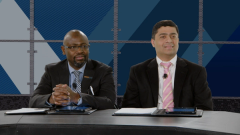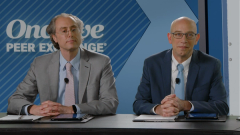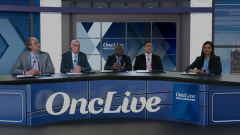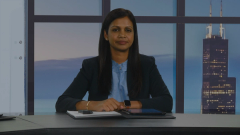
Patient Profile 3: A 70-Year-Old Man with SCLC Receiving Chemotherapy in the Second-Line Setting
Dr Jared Weiss presents the profile of a 70-year-old male patient with SCLC who received chemotherapy in the second line setting for discussion to the panel.
Episodes in this series

Charu Aggarwal, MD, MPH: Jared, why don't you take us through the next case? I understand you have a case of third or second line.
Jared Weiss, MD: All right. Our third patient profile. This is a 70-year-old man diagnosed with small cell a year previously. He had a 35-pack-a-year smoking history and presented with severe shortness of breath and cough to the emergency room. Get a chest X-ray that showed pneumonia and a central chest mass. CT subsequently showed a bulky central lung mass, hilar and mediastinal lymphadenopathy compressing both the SVC and multiple central airways. He had an endobronchial ultrasound, transbronchial fine needle aspirate, that showed small cell lung cancer. And because we're in the US, [United States] he had a PET [positron emission tomography] and that showed bone metastases as well. He had an MRI without brain metastases. This frontline treatment was a first cycle was of carboplatin and etoposide was given inpatient. This led to rapid improvement in his symptoms and discharge from the hospital within a week. And that's fairly typical, not an exceptional case. He received 3 additional platinum doublet cycles, with atezolizumab grafted on starting in cycle 2 on the outpatient basis. Chemotherapy was complicated by fatigue, nausea, alopecia, multiple episodes of febrile neutropenia, despite the use of secondary prophylaxis with Neulasta,® [pegfilgrastim] which was itself complicated by bone pain. Again, not an atypical or extreme profile. But happily, he did have a complete response and was treated with maintenance atezolizumab. His quality of life notably improved over the ensuing months. There are 2 things that harm our patients' physical quality of life, the most, the cancer and the things we do to them. And this was a cytotoxic free period and a period free of cancer symptoms. Intentionally not giving you a total duration here to provoke conversation, but he sees you in consultation because his cancer has progressed while on maintenance atezolizumab. He was nearly due for imaging when he became short of breath, started to cough, he received his CT just a bit early that showed progression in his central chest, as well as possibly in bony metastases, and he had a new liver met evident. He did have a repeat brain MRI, which remained negative for metastasis. In summary, this is a patient who's significantly suffering from his cancer, from symptoms of progression of his cancer, but also afraid of chemotherapy adverse effects because of how badly it went the first time for adverse effects. Options are discussed, amongst these are multiple clinical trials. Clinical trial of lurbinectedin with trilaciclib added was discussed, a CAR-T trial was discussed, traveling for a tarlatamab study was discussed. But as is typical of many patients with small cell in the US and a barrier sometimes to our development of new agents, the patient was not able to travel due to the large financial burden of doing so. He noted that a relative would have to take the day off from work and that- even the cost of the tank of gas would be a very big deal of the significant financial toxicity for the patient. And in this case, a recommendation was made for repeating carboplatin and etoposide, this time with proceeding trilaciclib as Charlie and Taofeek were recognizing where this was going to go because they know me. There was a low threshold recommended. This was a patient treated then back in the community to have a very low threshold to add pegylated filgrastim back for secondary prophylaxis. If cycle 1 didn't go well with trilaciclib, recommendations were given for aggressive antiemetic support, a recommendation was given to consider calcium, vitamin D and denosumab for the bone- brain- bone metastases, and the patient was provided gas cards and connected with a local advocacy organization to help with some of the financial burdens and barriers to treatment.
Transcript edited for clarity.










































